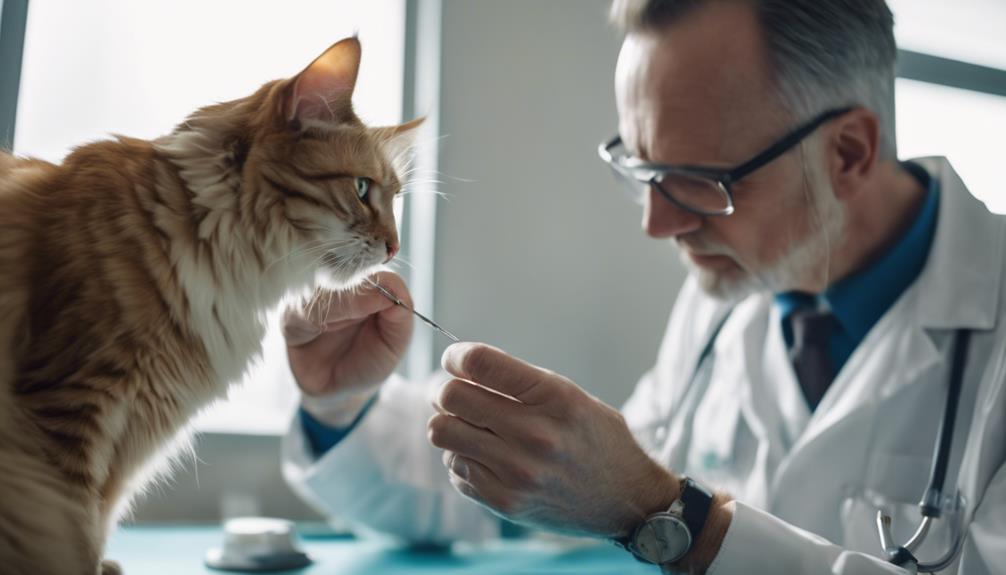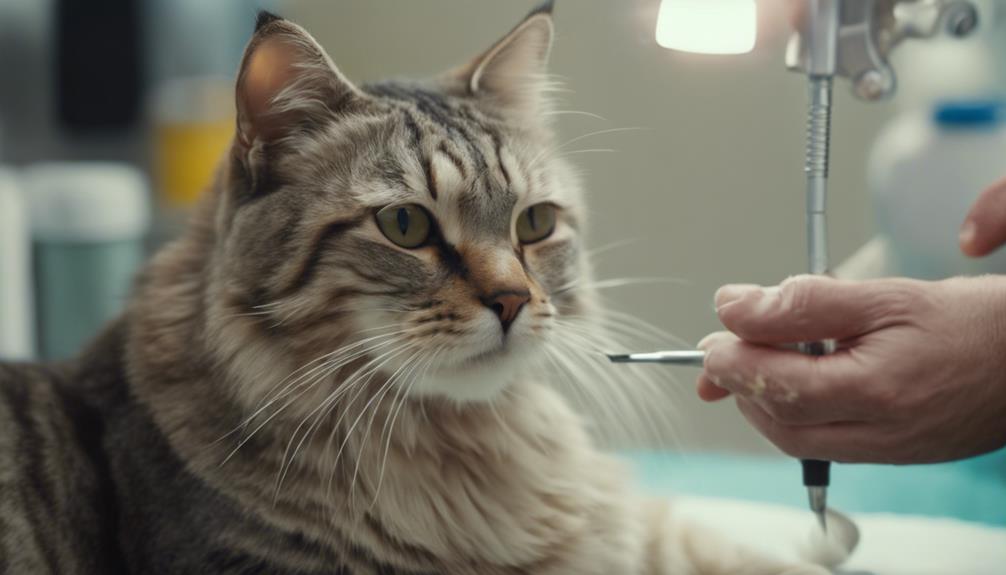Cat ear infections pose a significant concern for cat owners, given the potential complications they entail. Understanding the symptoms and appropriate treatments is crucial for maintaining your feline companion's ear health.
While veterinary intervention is key in addressing infections effectively, exploring natural remedies can also complement traditional approaches.
Stay tuned to discover how simple home remedies and preventive measures can contribute to managing and preventing cat ear infections, ensuring your pet's well-being and comfort.
Key Takeaways
- Cat ear infections can be caused by ear mites or allergies to common substances.
- Symptoms include scratching, head shaking, red skin, discharges, and foul odors.
- Veterinary treatment is crucial to diagnose and treat ear infections effectively.
- Regular ear cleaning and allergy testing can help prevent and manage cat ear infections.
Causes of Cat Ear Infections
Ear mites, microscopic parasites that are highly contagious among animals, are a common cause of cat ear infections. These tiny creatures thrive in the warm, dark environment of a cat's ear canal, causing intense itching and irritation. This constant scratching due to the discomfort can lead to inflammation and secondary bacterial infections.
In addition to ear mites, cats can also develop ear infections from allergies triggered by substances like dust mites, seasonal allergens, or specific proteins found in their diets. Understanding these causes is crucial in identifying and treating cat ear infections effectively, ensuring the well-being and comfort of our feline companions.
Symptoms to Watch For
Symptoms that indicate a potential cat ear infection include common behaviors like scratching and head shaking, along with visible signs such as red skin, discharges in various colors, and an unpleasant odor emanating from the ears. Cats may also exhibit sensitivity when their ears are touched, tilt their heads to one side, or have difficulty maintaining balance. Additionally, excessive wax buildup or crusts around the ear canal can be indicative of an underlying infection.
It is important to observe your cat's behavior closely and seek veterinary attention promptly if you notice any of these symptoms persisting, as untreated ear infections can lead to more severe complications. Regular monitoring and prompt intervention can help ensure your cat's ear health and overall well-being.
Importance of Veterinary Treatment

Seeking prompt veterinary treatment is crucial for addressing cat ear infections effectively and preventing potential complications that may arise if left untreated. A veterinarian's expertise is essential in diagnosing the underlying cause of the infection, whether it be due to ear mites, allergies, or other factors.
Early intervention can help alleviate discomfort for your feline companion and prevent the infection from spreading to the inner ear, which could lead to more serious issues like scarring and even deafness. By seeking professional veterinary care, you ensure that your cat receives the appropriate treatment, whether it involves topical medications, ear cleansers, or oral antibiotics.
Diagnosis and Medication Options
Understanding the specific cause of a cat's ear infection is paramount in determining the most effective diagnosis and medication options for prompt treatment and resolution. A veterinary examination typically involves taking ear swabs to identify the root cause, whether it be ear mites, bacterial or yeast infections, or allergies.
Based on the diagnosis, the veterinarian will prescribe appropriate medications, often in the form of topical treatments for mild cases and oral medications for more severe infections. It is crucial to administer the medication as directed and complete the full treatment course to ensure the infection is fully eliminated and to prevent recurrence.
Seeking veterinary guidance and following prescribed treatments diligently are essential steps in resolving cat ear infections effectively.
Completing the Treatment Course

To ensure the effective eradication of cat ear infections and prevent future recurrence, diligent completion of the prescribed treatment course is imperative. Cutting short the treatment regimen may lead to lingering infection or the development of antibiotic-resistant strains.
It is crucial to administer medications as directed by your veterinarian, even if the symptoms seem to have subsided before the course is finished. By completing the treatment course, you ensure that the infection-causing organisms are fully eliminated, reducing the likelihood of a relapse. Consistency and adherence to the prescribed schedule are key to successful treatment outcomes.
Natural Prevention Methods
One effective method for preventing cat ear infections naturally is through regular ear cleaning at home. By gently wiping your cat's ears with a soft cloth or cotton ball moistened with a vet-approved ear cleaner, you can remove excess wax and debris that may harbor bacteria or fungi.
Positive reinforcement techniques, such as offering treats or praise during the cleaning process, can help make it a positive experience for your cat. Additionally, maintaining an indoor environment can reduce exposure to allergens that may trigger ear infections.
If your cat experiences recurrent ear infections, allergy testing may be necessary to identify potential allergens that could be causing the issue.
Additional Resources and Information

For further guidance and detailed information on managing cat ear infections, reputable veterinary websites and pet health publications can serve as valuable resources. These sources offer in-depth articles, expert advice, and frequently asked questions sections to address common concerns pet owners may have regarding their cat's ear health. Additionally, online forums and communities dedicated to pet care can provide firsthand experiences and recommendations from other cat owners dealing with similar issues. Below is a table summarizing some reputable online resources for cat ear infection information:
| Resource | Description | Website |
|---|---|---|
| American Veterinary Medical Association | Official website providing trusted pet care information | [Link](https://www.avma.org/) |
| PetMD | Online resource offering comprehensive pet health information | [Link](https://www.petmd.com/) |
| Cornell Feline Health Center | Trusted source for cat health articles and resources | [Link](https://www.vet.cornell.edu/departments-centers-and-institutes/cornell-feline-health-center) |
| The Spruce Pets | Pet care website with expert-reviewed content on cat health | [Link](https://www.thesprucepets.com/) |
Frequently Asked Questions
Can Indoor Cats Still Get Ear Infections?
Yes, indoor cats can still get ear infections. Factors like ear mites, allergies, or improper ear cleaning can contribute. Regular veterinary check-ups, ear cleaning, and awareness of symptoms like scratching and head shaking are crucial for early detection and treatment to prevent complications.
Are There Specific Breeds of Cats That Are More Prone to Ear Infections?
Certain cat breeds, like the Scottish Fold, Himalayan, and Persian, are more prone to ear infections due to their unique anatomy. Regular ear care and veterinary check-ups are crucial for these breeds to prevent and manage ear issues effectively.
Can a Cat's Diet Play a Role in Ear Infections?
A cat's diet can play a role in ear infections as food allergies can trigger inflammation. Common allergens like chicken, beef, and turkey could lead to ear issues. Consult a veterinarian to determine if dietary changes could alleviate ear infection symptoms.
Is It Safe to Use Over-The-Counter Medications for Cat Ear Infections?
It is not safe to use over-the-counter medications for cat ear infections without veterinary approval. Improper treatment can worsen the condition or lead to complications. Consult a veterinarian for accurate diagnosis and appropriate treatment options.
How Can Stress or Anxiety in Cats Contribute to Ear Infections?
Stress or anxiety in cats can weaken their immune system, making them more susceptible to infections, including ear infections. Behavioral changes, like excessive scratching or head shaking, may accompany this, necessitating veterinary evaluation and appropriate treatment.
Conclusion
In conclusion, cat ear infections are a common health concern that can have serious consequences if left untreated. Recognizing symptoms early and seeking veterinary intervention is crucial for effective treatment.
With proper diagnosis, medication, and completion of the treatment course, cats can recover from ear infections successfully.
Additionally, incorporating natural prevention methods such as regular ear cleaning and allergy testing can help maintain optimal ear health for feline companions.




